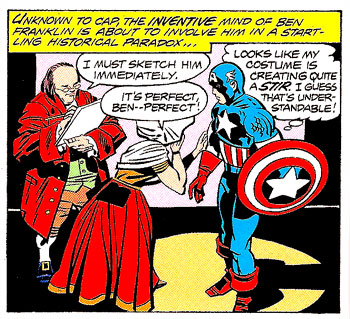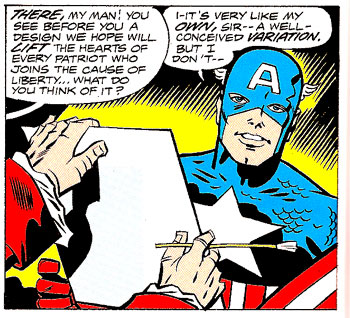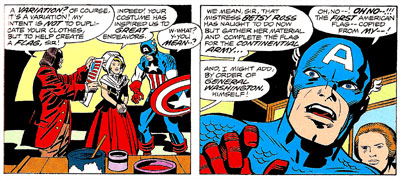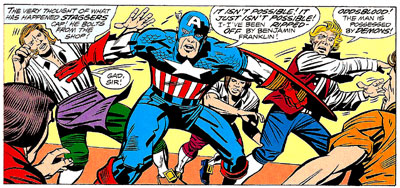Following up this post, here’s the way to do the scan-and-OCR thing (if you are a mac user). [click to continue…]
From the category archives:
Information Technology
I’m an undisciplined note-taker. I like to read a lot, putting post-its or other suitable markers in the pages as I go, and planning with the best of wills to take notes later. (I type very quickly, after all. I should be able to take notes even though I use so many post-its.) But then I just never get around to the sloggy, typing-it-all-in part. Recently I’ve tried to change things up. I sit down with a stack of books full of post-its and scan in just the post-it’ed bits, plucking the fluttering yellow feathers from these literary birds as I go, until I could stuff a whole pillow with used post-its by the time the night is over. I turn all the scans from any given book or article into one PDF, and I use Acrobat’s OCR capacity to make it semi-searchable. I can do something else while I work, like listen to an audiobook or podcast. I find this semi-mindless tidying of the aftermath of my reading mind’s life to be relatively pleasant activity. Now I want to take it to the next level, making the most of all my PDF’s (and docs in other formats, too, of course): does anyone here use, for example, DEVONthink, which some people have told me is good and useful. (But I am suspicious that these people are more obsessive than I about this sort of thing. I’m not a database-devotee by nature. I’m not going to go scripting stuff for DEVONthink. I know I won’t.) DEVONthink seems like a good deal because it has OCR based on ABBYYFineReader. And DEVONthink doesn’t even cost more than FineReader. Acrobat’s OCR, although adequate for basic purposes, is not great, and FineReader is supposed to be pretty good. So even if that was all I used it for …
Tell me of your time-saving note-taking methods, but don’t tell me to type it all in. What are good scanning products and OCR software suites and notetaking software. I’ve been using Zotero and I like it just fine. But maybe DEVONthink is better enough to be worth paying for, especially with the OCR?
Some thoughts, related to Michael’s ‘going pro’ post and Kieran’s recent post on impact factor. To what extent is the whole internet afflicted with the Matthew Effect? “For to all those who have, more will be given, and they will have an abundance; but from those who have nothing, even what they have will be taken away.” If you want to be a bit more specific, to what degree are search results afflicted by it?
Let me illustrate with a couple cases I’ve personally noted, which I suspect are representative. [click to continue…]
Lemme horn in on Quiggin territory here. I just flew home to Singapore from New York and read about a third of Justin Fox’s The Myth of the Rational Market: A History of Risk, Reward, and Delusion on Wall Street [amazon] on the flight. (You can view my takeoff here.) Verdict: it’s good! Chapter 1 contains a lively portrait of Irving Fisher. He was, I have learned, a boldly quantitative economic pioneer who pronounced in print just before the crash of ’29 “stock prices have reached what looks like a permanently high plateau.” He lost his personal fortune in the Great Depression. (So he’s a nice emblem for Fox’s book – quants come to practical grief when reality neglects to live up to ideal model standards.)
For his doctoral thesis [completed in 1893] he devised the most sophisticated mathematical treatment yet of economic equilibrium, and he also designed and built a contraption of interconnected water-filled cisterns that he described as “the physical analogue of the ideal economic market.” Many decades later, economist Paul Samuelson judged this work to be “the greatest doctoral dissertation in economics ever writter.” It launched Fisher into a leading role among the world’s still-sparse ranks of mathematical economists. (10)
I want to hear more about his bold, pre-20th Century design for a compucistern system. [click to continue…]
This excellent piece by Jonathan Zittrain explains very nicely the potential downsides of how cloud computing is developing these days. (“Cloud” here refers to having all our data reside out there on others’ machines instead of on our own devices.)
A few quotes, but as we like to say, read the whole thing.
The crucial legacy of the personal computer is that anyone can write code for it and give or sell that code to you — and the vendors of the PC and its operating system have no more to say about it than your phone company does about which answering machine you decide to buy. Microsoft might want you to run Word and Internet Explorer, but those had better be good products or you’ll switch with a few mouse clicks to OpenOffice or Firefox.
[..]
The iPhone’s outside apps act much more as if they’re in the cloud than on your phone: Apple can decide who gets to write code for your phone and which of those offerings will be allowed to run. The company has used this power in ways that Bill Gates never dreamed of when he was the king of Windows: Apple is reported to have censored e-book apps that contain controversial content, eliminated games with political overtones, and blocked uses for the phone that compete with the company’s products.
[..]
When we vest our activities and identities in one place in the cloud, it takes a lot of dissatisfaction for us to move. And many software developers who once would have been writing whatever they wanted for PCs are simply developing less adventurous, less subversive, less game-changing code under the watchful eyes of Facebook and Apple.
On a related note, this post seems like an appropriate occasion to link to this great cartoon, which the artist created over 10 months ago.
Happy 4th of July! Since I’ve been pondering creative rights and copyright extension, I’ll take this patriotic occasion to remind you of that famous scene in Captain America’s Bicentennial Battles in which Cap travels back in time only to have the design for his uniform become the original inspiration for the US flag. Cap is upset. Why should Betsy Ross get credit, after all? A creative continuum conundrum. (via Bully.)




A different ethics/etiquette question. My Plato book will be out in paper form in a month or so. When I made the deal with my publisher to let the e-stuff go free (which might reasonably be deemed a serious drag on the paper market) I promised to take it upon myself to work the e-angle fairly aggressively, marketing-wise. And now I ask myself: where do I draw the line between marketing and spamming? Normally I wouldn’t even consider sending an email to 200+ people I don’t know. That’s spam. But sending a bunch of philosophers I don’t know a short email telling them, simply, that there’s an Intro Plato text available free – just click – isn’t so obnoxious. Is it? Spamming means: not giving a damn that you are putting a huge number of people to the mild inconvenience of deleting something they don’t want. Maybe we need a theory of ‘just marketing’, on the lines of ‘just war’: it’s ok to send a mass email so long as you have taken reasonable precautions to exclude those with non-consumer status from the target zone. But that’s a bit vague. Suppose you were in my position. I’ve committed to being an aggressive e-marketer, which of course is in my own self-interest as well: how can I wage an aggressive but just e-marketing campaign?
Having knocked Mark “digital barbarism” Helprin around in a trio of posts – in one of which I remarked that the guy should probably listen to EconTalk to learn that libertarians are actually skeptical about the merits of copyright extension – I am duty-bound to report that Helprin was just a guest on EconTalk. [click to continue…]
To punish myself for panning Helprin’s book without reading, I decided to go back and reread the excerpt at least. And that old op-ed. And I’ve decided: there’s more merit here than I had realized. Let me lay it out for you. (But first, ask yourself: wouldn’t you rather be reading Squid and Owl? Isn’t that a more healthful use of your time?) [click to continue…]
Henry and a few others suggested I was a bit hard on Douthat for not being hard enough on Helprin. Douthat may be guilty only of the venial sin of obligatory civility in the face of a bad book, not the mortal sin of Higher Broderism. (Although one hopes the critic’s motto is not ‘if you can’t say something nice, don’t say anything at all.’) It really was his last paragraph that set me off, and it’s worth saying why. I’ll leave Helprin and even Douthat mostly out of it. [click to continue…]
Matthew Yglesias goes way too easy on Ross Douthat’s book review of Mark Helprin’s Digital Barbarism: A Writer’s Manifesto [amazon].
Let’s start with the book itself. It is, I gather, a grossly metastasized, page-wise, rewrite of his shockingly ignorant (it was widely and correctly noted at the time) NY Times op-ed from a couple years back, “A Great Idea Lives Forever, Shouldn’t Its Copyright?”. And why exactly does it follow that terrible ideas deserve book deals, one might ask? (Here’s the exhaustive wiki-buttal that op-ed inspired.)
Larry Lessig wrote a long review of Barbarism last month, which he followed up here. Having not read Helprin’s book – and I even read Jonah Goldberg’s book, sweet heaven help and forgive me! – I’m not in a position to add anything except that Lessig’s response leaves me in little doubt that Helprin has contrived to learn nothing from that initial op-ed debacle. He still has no idea whatsoever what the other side’s views are, let alone what the grounds for them might be. (I guess there’s something inadvertently apt about the ‘barbarism’ in his title, if it’s true that the term derives from some Proto-Indo-European speaker’s sense that foreigners are just going ‘bar-bar’, not actually saying anything.) [click to continue…]
First: why aren’t you reading more Squid and Owl? Last week we had assassination by siege engine and undersea regicide. Now we are off on a thrilling mock-Kipling romp. You are a fool not to click.
Next: even more of those psychedelic biology scans up. This one for example: [click to continue…]
As I mentioned previously on this blog, I had a somewhat unfortunate experience a few months back. I was working in my office, when a work-study knocked on my door with a brand new MacBook Pro, which he told me had been sent over from my school’s technology program. I was nonplussed, and told him that he must be wrong, that I hadn’t ordered one etc, but he insisted, and indeed my name was on his work-order form. So I finally acquiesced, on the grounds of gift-horses, and the wisdom of not inquiring too closely into the dental conditions thereof, and unpacked it. 2 hours later, I was completely hooked – more rational and altogether nicer than my Windows box, while much smoother than my Ubuntu installation. I would have wanted to take it home and marry it, if I wasn’t married already. 3 hours later, I discovered that of course it had been a mistake, and that it was in fact intended for a colleague with a vaguely similar name (the person preparing the work order had not unreasonably gotten confused). And I had to give it back.
Hence my proposal (copyright Henry Farrell 2009, but if Apple want it, they can have it in return for a rolling program of hardware replacement to be negotiated) for a new TV ad series, building off of the classic series from the early 2000s, and entitled (in honor thereof) Bait and Switch. Deliver Apple computers to a number of unsuspecting Windows users, selected from various advertising friendly demographics. Give them a few days to get used to their new machines. Then tell them that it is a mistake, and that they will have to give them back and return to Windows. And film their reactions, consternation, refusal etc. I imagine it would make for great television (perhaps I am speaking from the zeal of the new convert).
Second, and more seriously, having been bait-and-switched myself, I have finally taken the plunge and bought a MacBook Pro for the new book that I hope to start writing. Good software recommendations and general tips are gratefully appreciated. I already know about (and have bought) TextMate, and plugged in MultiMarkdown thanks to Kieran’s earlier tutelage (he was the first person I emailed when I thought I had been given a new Apple free, gratis and for nothing). I’m also probably getting Scrivener, for aforementioned project. But any other recommendations for productivity software etc would be gratefully appreciated.
 Like Maria, I haven’t exactly been ROFL in response to the trying-to-be-funny material floating out there today, but the Electronic Frontier Foundation‘s newsletter did impress me. Since it doesn’t seem to be on EFF’s homepage, and since they’ve explicitly stated that we can repost the whole thing, I’m doing so after the jump. (I hope they won’t mind my playing with their logo either.) Enjoy! [click to continue…]
Like Maria, I haven’t exactly been ROFL in response to the trying-to-be-funny material floating out there today, but the Electronic Frontier Foundation‘s newsletter did impress me. Since it doesn’t seem to be on EFF’s homepage, and since they’ve explicitly stated that we can repost the whole thing, I’m doing so after the jump. (I hope they won’t mind my playing with their logo either.) Enjoy! [click to continue…]